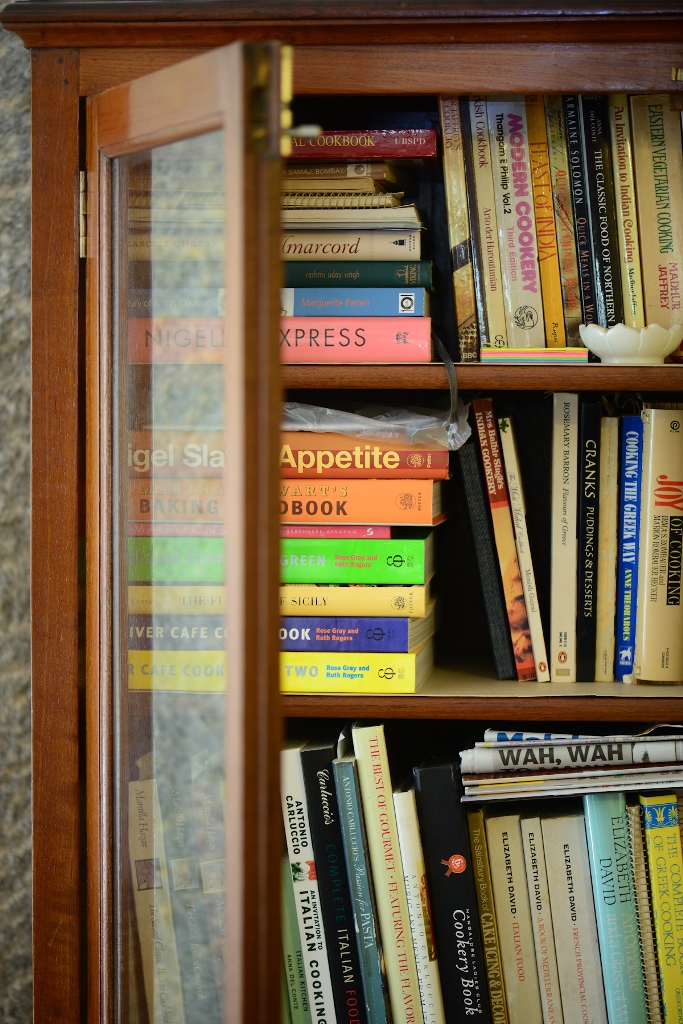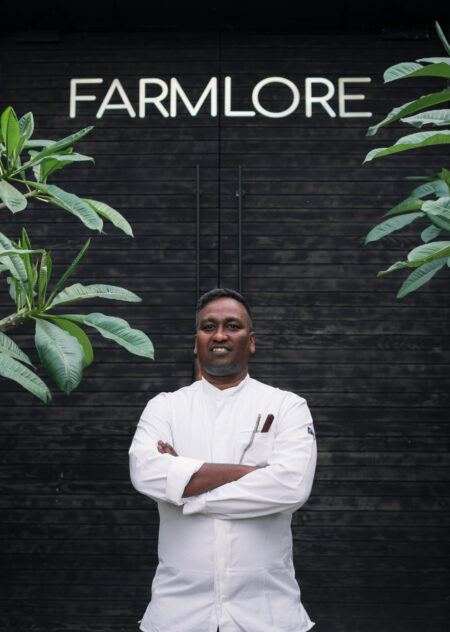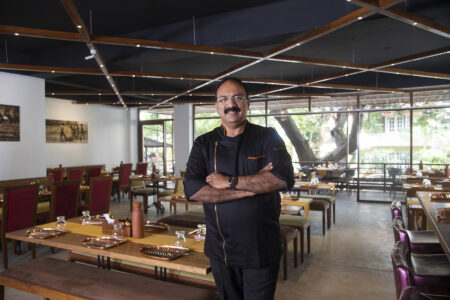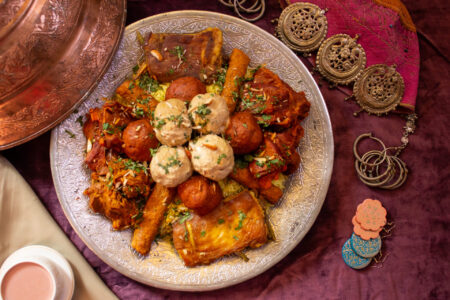“Cookbooks,” declared Janet Street- Porter famously, “are the new porn.” She could have meant the dangerously attractive Nigella Lawson, poised to bite into a chicken drumstick held in her hands, smiling seductively at the camera; or a recipe for Slut Red Raspberries in Chardonnay Jelly, in her book Forever Summer. Maybe it was Jamie Oliver’s provocative title, The Naked Chef. That turned out to be quite tame after all. It referred to stripping your kitchen needs down to the bare essentials. I imagine, then, that it was the new breed of cookbooks that inspired her remark – lavish productions, with sensuous prose and slick photography, which leave us gasping and staring, lingering endlessly over their glossy pages. And all those exotic ingredients that promise to add excitement, and liven up our mundane lives. Or fantasy kitchen gadgets that hint at endless pleasure. Whichever way it is, cookbooks are here to stay. There are entire bookstores devoted to cookbooks, and collectors pursue books by their favourite chefs, or out of print, or antiquarian cookbooks with all the fervour of collectors of anything at all.
When, aged sixteen, I invested a chunk of precious pocket money in a book titled Cookery in Colour, I certainly did not know where I was headed. The author turned out to be Marguerite Patten, the one of the most famous of all British cookery icons – Jamie Oliver has dedicated his latest book to her; and, like Gary Rhodes, I can say that she gave me my first inspiration to cook. And although much water has flowed under the bridge, so to speak, since that first purchase, I still go back to that tattered old copy for basic, unshakable recipes for old favourites like Cream of Tomato Soup, Pineapple Upside Down Pudding and Roast Chicken.
“Do you really cook every single one of those recipes?” friends often ask disbelievingly, staring at the collection of cookbooks that now threatens to take over my entire home. Of course not: I browse, linger, stare, plan, cook; and on rainy afternoons, I mull over words like “mirepoix”, “court bouillon”, “bouquet garni” junipers, “yakhni,” and I am transported. Cookbooks are surely not just about cooking, but the whole experience of food. Purists may argue that they must work, but I think it is also about inspiration, adaptation, and above all, using your imagination. Gazing at the strange shapes, colours and textures of unfamiliar fruits, berries and vegetables just confirms my faith in the creativity and generosity of nature. And what about the fish of other seas? They must taste and cook quite different. You don’t have to cook everything; it’s possible to imagine tastes, without so much as picking up a ladle. Even the names of dishes are journeys to far off lands. The prose of good food writing compares with some of the best literature in the world.
I have my sentimental favourites. Like The Polish Kitchen, a gift from the young Polish au pair who worked for us; autographed copies of Antonio Carluccio, Rick Stein and Ummi Abdullah; and gifts from friends, which will always be special. My own, handwritten recipes, collected over the years, from friends, family, coaxed out of unyielding aunts, from generous chefs and acquaintances all over the world now fill books and folders. But the ones I really treasure are those garnered from a lively and affectionate correspondence with my mother – in –law, when we lived overseas. Yearning for the flavours and fragrances of a family kitchen, her letters were bits of home, filled with wonderful recipes, news of family, and snippets about the comings and going of various relatives. Although I had to prune the letters drastically, the recipes, in her firm, upright handwriting, on the original, pale blue aerogramme paper, have been filed away, with bits of exciting gossip still lingering at the edges.
My husband and children are quite indulgent about this particular obsession of mine, as they reap the benefits of my culinary peregrinations. The food on the family table is never dull, and inspires conversation and comment at every meal. Like one of my favourite cookery writer’s, Marcella Hazan, I can say “I learned to cook by cooking.” I recently read about the Academia Barilla, in Parma, Italy, set up by the eponymous pasta manufacturers. A theatre, lecture hall and kitchens, and – 8500 cookery books in over ten languages, and 5000 menus! I think I know where I want to spend my next holiday. In the meantime, I dream and plan for a cookbook of my own. Like Alexander Dumas, who wrote in 1869, “I intend that my last work shall be a cookbook composed of memories and desires.”
This article appeared in Food Lovers Magazine Vol. 3 Issue 4 August/September 2009.
Image Credits: Nithin Sagi





Hi Kaveri
I chanced upon your blog and loved it! I am from Kerala but never lived there. As i am getting older, i realize that i miss all the naadan food..It was interesting to read about Abida and Mappila food.
Hi Swapna, I’m really happy that you enjoyed this article. Abida’s daughter’s wedding was extraordinary, the food was like nothing that I had tasted before, full of unusual flavours.There was an enormous spread, so I doubt if we could have got a better introduction to the cuisine. Do keep reading these pages, and if you are interested in other cuisines, do read The Coorg Table. Best wishes. Kaveri
Dear Kaveri
I did visit Kozikode Kalikat Baliyapattam in 1970 We had Timber business We used to stay in Mopalahs homes I used to enjoy their food Your beautiful artical took me in my old memories I did learn these recipes God bless you !
Hello Jaya, thank you for sharing your memories. The Mapillas have some wonderful food,and they are very hospitable people- you must have enjoyed your time with them. I’m sure that you still make those dishes for friends, and for yourself. I’m so glad you liked the article, thanks for your appreciation. Warm wishes.Kaveri
Dear Kaveri,
I was so delighted the words which explained each and every delicacies of the Malabar Coast. I will be following Abida Rasheed’s recipies. I just learnt about you today and I will be starting to try out the recipies. I love to try and have each delicacy on my own as well.
Thank you Kaveri.
Hello Maureen, thank you for writing in. I’m delighted that you enjoyed reading about Abida, and the Mappila food she cooks.
The recipes on this blog, The Coorg Table are all authentic Coorg recipes, passed down in my family, my husband’s family, and some of them from special Coorg friends. They are what I cook regularly for my own family and friends. Do try them out, and I am sure you will love them as much as we all do. I would be very happy to hear from you again, and answer any questIons that you may have – and also, which dishes you liked the most! Best wishes. Kaveri.